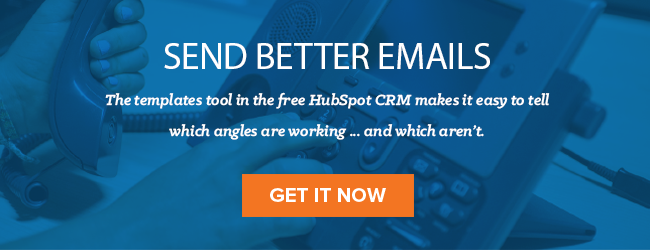
Most salespeople begin relationships with their prospects with little to zero credibility. There are ways to build up your trustworthiness in advance, like blogging, getting an introduction, crafting a personalized email, working for a well-respected company, and so on.
But HubSpot’s research shows most prospects still don't trust you when you reach out.
To win their respect and attention, don’t act like an amateur rep -- even if you are. Buyers are busy: They’re not going to waste their time on a salesperson who seems relatively clueless.
Avoid exposing yourself as a rookie by steering clear of these eight phrases.
1) “Why did you decide to take this meeting?”
An experienced salesperson will steer clear of this question. Not only is it overused, but the answer is obvious: Whether the rep proactively reached out or contacted an inbound lead, her prospect found her value proposition compelling.
So why do amateur reps ask this question? They’re actually trying to figure out which issue their prospect is experiencing that’s relevant to their product. In other words, they’re being lazy and asking buyers to do their discovery work for them.
HubSpot sales director Dan Tyre suggests instead:
- “What’s your biggest obstacle to [prospect’s team, department, or company] growth?”
- “What does your boss obsess about?”
- “What takes up the most time in your day?”
- “What are the executives on your team trying to accomplish?”
These questions allow you to surface opportunities for helping the buyer they might not even know about.
2) “Real deal”
If your product works, you don’t need to make big claims. Telling the buyer your solution is “the real deal,” “one of a kind,” or “the only product of its type” will make them skeptical, not intrigued.
Rely on customer case studies and data to make your point instead. For example, you might say, “76% of our customers see their weekend sales double in three months or less.” Statistics like these are far more convincing.
3) “The reality is … ”
Rookie reps use this line to kick off a frank, tell-it-like-is discussion with their prospects. The problem? It can sound offensive -- as though they don’t trust buyers to identify “reality” on their own.
If your prospect feels like you’re questioning their intelligence, they’ll usually stop listening. You’ll have to work hard to reengage them.
Instead of “the reality is … ”, try these alternatives:
- “Some people are surprised that .... ”
- “Contrary to popular belief … ”
- “I didn’t expect this, but … ”
These phrases let you introduce an unexpected fact without insulting your prospect.
4) “Honestly”
Phrases like “truthfully,” “to be honest,” and “I’ll be candid with you” imply that up until this point, you’ve been misleading or manipulating your prospect.
Even if he doesn’t question what you’ve already told him, he’ll probably perceive you as another stereotypical, fast-talking rep.
Instead of telling the buyer you’ll be honest, just be honest. It’s as simple as that.
5) “Can you tell me a little bit about [prospect’s business]?”
You’ll rarely hear a veteran rep use this question. He’s well-aware how quickly his prospect will lose interest if she thinks he hasn’t done any research.
Instead, a well-trained salesperson will open with a specific fact about the buyer’s industry, organization, role, situation, or likely challenge before asking his question.
Here are a few examples:
- If you offer relocation assistance: “I see you just opened a new office in Oklahoma. How is the employee relocation process going?”
- If you sell to ecommerce sites: “You have a wide selection of products. How do you typically source them?”
- If your prospect works in a three-person department: “Your team is fairly small relative to your company. What’s the workload like?”
6) “Who’s the decision maker?”
Nothing says “I’m new to selling” like this question. If you’re talking to a junior employee, you’ll make them feel unimportant and small -- which means they’re far less likely to help you win over the ultimate authority.
Even if you are talking to a higher-up, they might not think of themselves as the “decision maker.” B2B purchase decisions involve 6.8 stakeholders on average. Each one has influence.
A better question would be: “Have you bought a similar product before?" If they say yes, ask them to describe the buying process.
Your prospect’s answer will help you pinpoint the people with the greatest sway over the purchase.
7) “I promise … ”
As senior salespeople know all too well, it’s a bad idea to give promises in sales. There are too many external factors and variables -- your solution might work flawlessly, but the prospect might use it ineffectively, their market might shift, a new competitor might change the landscape, and so on.
Avoid sounding like the new kid on the block by using conditional statements instead. You might say, “If you follow [X best practices], you’ll likely see [Y results] in [Z amount of time]” or “Our customers see [A impact] in [B time] when they implement [C approach].”
8) “You don’t know me, but … ”
Inexperienced reps often feel nervous about reaching out to new prospects, so they use this opener. However, it only makes them look insecure.
Even worse, most buyers won’t keep reading. You’re a stranger -- why would they care what you have to say?
If you share a connection or common interest, begin your email or call with that instead. For instance, “I’m also a major fan of competitive gaming. Have you seen 'The King of Kong'?”
Once you’ve eliminated these dead giveaways of inexperience, buyers will be more likely to see you an authority. Earning their respect is a major step toward earning their business.








![How to Reply to a Sales Rejection Email From a Client [+ Templates]](https://www.hubspot.com/hubfs/timing-objection-responses-1.jpg)



